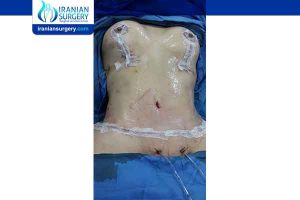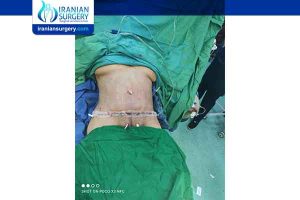Is a low-grade fever common after tummy tuck?
Is it normal to have a fever after liposuction?
reasons for fever after tummy tuck and liposuction
How do you know if you have an infection after a tummy tuck?
What causes fever after tummy tuck surgery?What causes low grade fever plastic after surgery?When should I worry about a fever after surgery?
A fever after tummy tuck surgery (usually during the first 48 hours after tummy tuck) is one of the most common complications that patients face. In fact, over half of all surgery patients will have a higher than normal temperature in the days following their procedure, for various reasons. Any fever that develops in the hours or days after a surgical procedure is considered a postoperative fever.
The good news about postoperative fevers is that most are not serious and can be easily treated with ibuprofen or acetaminophen, or nothing at all. In fact, for some low-grade fevers, no treatment is necessary. The bad news is that in some cases a fever after surgery can be the first sign of a major problem.

If you have a fever after your surgery, your surgeon may or may not prescribe antibiotics. Some surgeons prefer to prescribe "prophylactic" antibiotics for all of their surgery patients. Others will wait until testing indicates that antibiotics are necessary. In some cases, an antibiotic won't successfully treat a fever, because an infection is not the only reason for an increase in temperature.
The more time that passes between the day of your surgery and the day of your fever, the less likely the fever is to be related to your surgery, especially if weeks have passed with no issues.
Read more about : Abdominoplasty Podcast with Dr. Afshan shah
Read more about : Liposuction Podcast with Dr. Afshan shah
Read more about : Abdominoplasty with liposuction surgery , before and after surgery videos
Read more about : Tummy tuck recovery
Read more about : Maximum weight for liposuction
Read more about : How to get rid of fluid after liposuction?
What causes a postoperative fever?
Many things can cause a postoperative fever. To remember all the potential causes, medical students are taught something called the five Ws, which stand for:
. Wind. This refers to respiratory problems, such as pneumonia or atelectasis, a lung condition that’s sometimes caused by anesthesia.
. Water. The fever may be caused by a urinary tract infection.
. Walking. This refers to venous thromboembolism (VTE), which is a potential complication of surgery.
. Wound. This is an infection of the surgical site.
. Wonder drugs. Some medications, including certain antibiotics or medications containing sulfur, can cause a fever in some people. A central line site can also become infected and cause a fever.
While many things can cause a fever after surgery, most of them fall within these categories.
Read more about : Revision tummy tuck
Low-Grade Fever after Surgery
A low-grade fever is the most common complications after surgery. You should make your surgeon aware if you have a low-grade fever, which is a temperature that is one or two degrees above the normal reading of 98.6 degrees.
A fever of 99 is very common after surgery, especially the first week after a surgery with a healing incision. A fever, along with an incision that does not appear to be healing well is absolutely cause to update your surgeon and to possibly seek medical attention.
If your low-grade fever persists for several days, notify your surgeon that the fever has not resolved.
Moderate Fever after Surgery
A fever ranging from 100.6 to 102 is considered a moderate level of fever. Report the fever to your surgeon, and take action if your surgeon feels it is necessary.
Seek medical attention if your fever is accompanied by symptoms such as nausea, vomiting, an unexplained increase in pain, disorientation, drainage or angry redness around your incision, or any other condition that suggests that your recovery is not going as planned such as shortness of breath. A fever greater than 102 in an adult is high enough to warrant a trip to the emergency room.
Also, seek medical attention if your fever does not respond to a dose of Advil (ibuprofen) or Tylenol (acetaminophen) after an hour.
High Fever after Surgery
A high fever, which is a fever higher than 102 degrees in adults, requires immediate medical attention. This could mean that you have a serious infection, there is a problem with your surgical site, or you are reacting to a medication.
You could potentially receive antibiotics, have blood tests and blood cultures drawn or even be seen by your own surgeon if they are very concerned.
Read more about : Fat transfer
Read more about : Does CoolSculpting cause swelling?
Read more about : Tummy tuck scars after 5 years
Read more about : Good candidate for tummy tuck
How is it treated?
If you’ve had surgery in the last two days and your body temperature is a degree or two higher than it usually is, you can treat your fever with over-the-counter medications. Both acetaminophen (Tylenol) and ibuprofen (Advil, Motrin) can help bring down a high fever and reduce your symptoms.
If your body temperature is higher than usual by more than two degrees, it’s best to contact your doctor right away. You may need additional treatment, including:
. Antibiotics to treat an infection, either near the surgical site or in another part of your body
. Anticoagulants to treat VTE
. Chest physiotherapy, such as postural drainage, for atelectasis
If you develop a fever 5 or more days after surgery (but fewer than 30 days), it’s more likely to be the result of an infection requiring treatment than fevers that happen within a day or two.
Read more about : Mini Tummy tuck
How do I know if it’s serious?
While a fever is sometimes your body’s normal response to surgery, it can also be a sign of an underlying problem.
Call your doctor right away if you’ve recently had surgery and have a fever above 101°F. You should also call your doctor about any fevers that don’t start until several days after your procedure.
As you recover, also keep an eye out for any signs of an infection around your surgical site or any areas that received intravenous medication. Common signs of infection include:
. Swelling and redness
. Increasing pain or tenderness
. Drainage of a cloudy fluid
. Warmth
. Pus
. Bad smell
. Bleeding
Other signs that your postoperative fever might be more serious include:
. Unexplained leg pain
. Severe headache
. Trouble breathing
. Painful urination
. Frequent urination
. Nausea or vomiting that won’t stop
. A tear near the surgical site
. Severe constipation or diarrhea
If you notice any signs of an infection or other problem after surgery, it’s important to get treatment as soon as possible to avoid any lasting complications. If you can’t get a hold of your doctor, ask to speak to a nurse or head to an urgent care facility.
Is there any way to prevent it?
There’s no foolproof way to prevent postoperative fevers. However, doctors and nurses go to extreme lengths to keep hospitals and operating rooms as free of bacteria, viruses, and fungi as possible. If you’re concerned about a hospital-acquired infection, you can also ask your doctor or other hospital staff about their sanitation procedures and guidelines.
To reduce your risk of complications after surgery, there are also a few things you can do on your end.
Before you have surgery:
. Quit smoking. Smoking increases your risk of infection and blood clots.
. Don’t shave. Shaving anywhere near your surgery site can introduce bacteria into the skin. If you have a lot of hair around the surgical site, speak with your surgeon first to see if shaving is necessary.
. Wash your whole body. On the night before and morning of your surgery, you should wash with a surgical soap, like this one.
. Ask about antibiotics. Ask your doctor if they plan to prescribe antibiotics for you as a preventive measure.
After you have surgery:
. Know who to call. Before leaving the hospital, make sure you know who to call if you get a fever or have any unusual symptoms.
. Follow instructions. Your doctor should give you all the information you need about caring for your wound, such as any medications you should take and how often you should change your bandages.
. Wash your hands. Always wash your hands with soap and warm water before touching your incision for any reason, including scratching an itch. Also make sure anyone helping you change your bandages washes their hands as well.
. Get the right help. Make sure loved ones and caretakers wash their hands before helping you with wound care or catheters.
. Protect yourself. Ask visiting friends and family members to thoroughly wash their hands before entering your hospital room.
. Call for help. Contact your doctor immediately if you have a high fever or any other unusual symptoms.
Read more about : Liposuction in Iran
Read more about : Coolsculpting
Read more about : Abdominal etching
Read more about : Ideal bmi for tummy tuck
Read more about : Liposuction type
Read more about : Tummy tuck pain after 1 year
Read more about : Reduce swelling after tummy tuck
Read more about : Fat transfer side effects
Read more about : Vase liposuction side effects
Read more about : 4 weeks after vaser lipo treatment
Read more about : Vaser lipo pros and cons
Read more about : Coolsculpting vs liposuction



